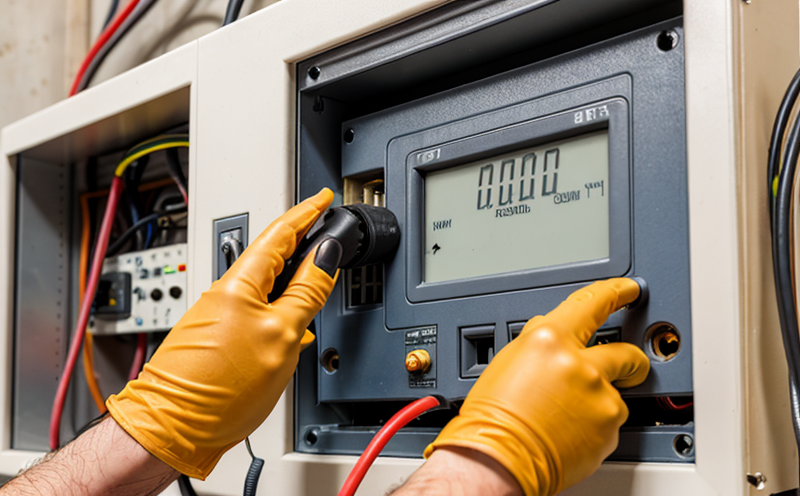ANSI C18.2M Part 2 Electrical Testing of Portable Secondary Batteries
The ANSI C18.2M standard, specifically its Part 2 section, provides a comprehensive framework for the electrical testing of portable secondary batteries used in consumer electronics and other applications. This service ensures that these batteries meet stringent safety, performance, and durability requirements as outlined by international standards.
Portable secondary batteries, also known as rechargeable batteries, are widely used in devices such as laptops, mobile phones, power tools, and medical equipment. The ANSI C18.2M standard is crucial for ensuring that these batteries operate safely and efficiently under various conditions. This service involves rigorous testing to ensure compliance with the specified standards.
The electrical testing focuses on critical parameters including internal resistance, voltage, capacity, and charge retention. These tests are essential for identifying potential issues early in the product lifecycle, which can help prevent malfunctions or safety hazards later on. By adhering to ANSI C18.2M Part 2, manufacturers demonstrate their commitment to quality and safety.
The testing process typically involves a series of steps aimed at evaluating the battery's performance under different conditions. This includes charging cycles, discharge tests, and temperature stress tests. These procedures are designed to simulate real-world usage scenarios and highlight any weaknesses in the design or manufacturing process.
One of the key aspects of ANSI C18.2M Part 2 testing is the internal resistance measurement. High internal resistance can lead to reduced battery life and performance, making it a critical parameter for evaluation. Voltage tests are conducted to ensure that the battery maintains its specified voltage levels throughout discharge cycles.
Capacity testing is another crucial component of this service. It involves determining how much charge the battery can hold after multiple charging cycles. This helps manufacturers understand the long-term performance and durability of their products. Charge retention tests assess the battery's ability to retain its charge over extended periods, which is important for portable devices that may go unused for days or weeks.
The testing process also includes environmental stress testing. Batteries are subjected to temperature variations ranging from cold storage conditions to high temperatures during operation. This helps identify any thermal management issues that could affect battery performance and safety.
For R&D engineers, this service provides valuable insights into the design and manufacturing processes of portable secondary batteries. It allows them to refine their products based on empirical data obtained through rigorous testing. Compliance officers benefit from this service by ensuring that all batteries meet regulatory requirements and industry standards. Quality managers can use the results to improve product quality and reliability.
Manufacturers who adhere to ANSI C18.2M Part 2 not only enhance the safety of their products but also build consumer trust through consistent performance and reliability. By providing accurate and timely test reports, this service supports continuous improvement in battery technology and design.
Why Choose This Test
- Ensures compliance with ANSI C18.2M Part 2 standards for electrical testing of portable secondary batteries.
- Provides critical data on internal resistance, voltage, capacity, and charge retention.
- Supports continuous improvement in battery technology and design through rigorous testing.
- Enhances product reliability and consumer trust by meeting stringent safety and performance criteria.
- Aids manufacturers in achieving regulatory compliance and industry standards.
Customer Impact and Satisfaction
The ANSI C18.2M Part 2 electrical testing service has a significant positive impact on customers by ensuring that portable secondary batteries meet the highest safety, performance, and durability standards. This translates into enhanced product reliability and increased customer satisfaction.
By adhering to this standard, manufacturers can demonstrate their commitment to quality and safety, which is crucial for maintaining brand reputation and attracting new customers. The detailed test reports generated by this service provide valuable insights that help improve product design and manufacturing processes.
The testing process also helps identify any potential issues early in the product lifecycle, allowing manufacturers to address them before they become critical problems. This proactive approach not only improves product quality but also reduces warranty claims and returns, thereby enhancing overall customer satisfaction.
For quality managers, compliance officers, and R&D engineers, this service offers a comprehensive solution for ensuring that portable secondary batteries meet international standards. It provides accurate and reliable data to support decision-making processes related to product development and manufacturing.
Competitive Advantage and Market Impact
The ANSI C18.2M Part 2 electrical testing service offers a competitive advantage by ensuring that portable secondary batteries meet the highest safety, performance, and durability standards. This is particularly important in today's highly competitive market where consumers expect reliable products.
By adhering to this standard, manufacturers can differentiate themselves from competitors by offering safer, more durable, and higher-performing products. This can help attract new customers and retain existing ones, thereby enhancing brand reputation and market share.
The detailed test reports generated by this service provide valuable insights that help improve product design and manufacturing processes. This enables manufacturers to stay ahead of the curve by continuously refining their products based on empirical data obtained through rigorous testing.
For quality managers, compliance officers, and R&D engineers, this service offers a comprehensive solution for ensuring that portable secondary batteries meet international standards. It provides accurate and reliable data to support decision-making processes related to product development and manufacturing.
The ANSI C18.2M Part 2 electrical testing service also has a positive impact on the broader market by promoting safer and more reliable products. This contributes to increased trust in the industry and helps foster innovation, as manufacturers are motivated to improve their products through rigorous testing and continuous improvement.





